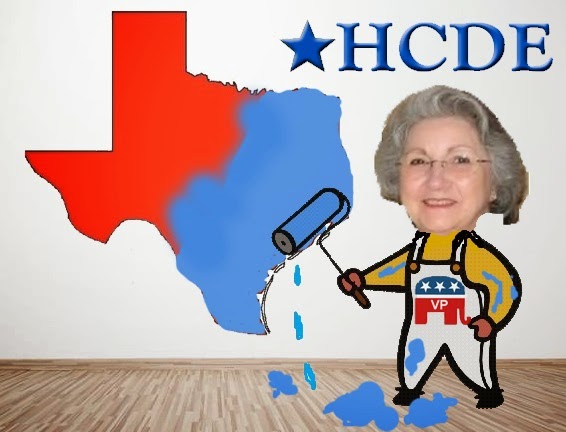
On May 19, 2014 I filed a simple request for public information –
to view the emails (from a 6 week period) of John Sawyer, the now former Superintendent ofthe Harris County Schools (aka-HCDE.)
All I really wanted was an outline of the day to day activities of HCDE. Instead, I got an outline of how HCDE is using our tax dollars to influence elections.
The first email attachment to raise my concern was sent on 2/26/14 from the HCDE Board President, Angie Chesnut, to George H Scott. Scott is a media/public policy consultant who writes a blog entitled “George Scott Reports.”
George Scott’s emails to Sawyer give you a glimpse of his work history. One reads:
“…In the meantime,
I just helped Alton’s school board candidates 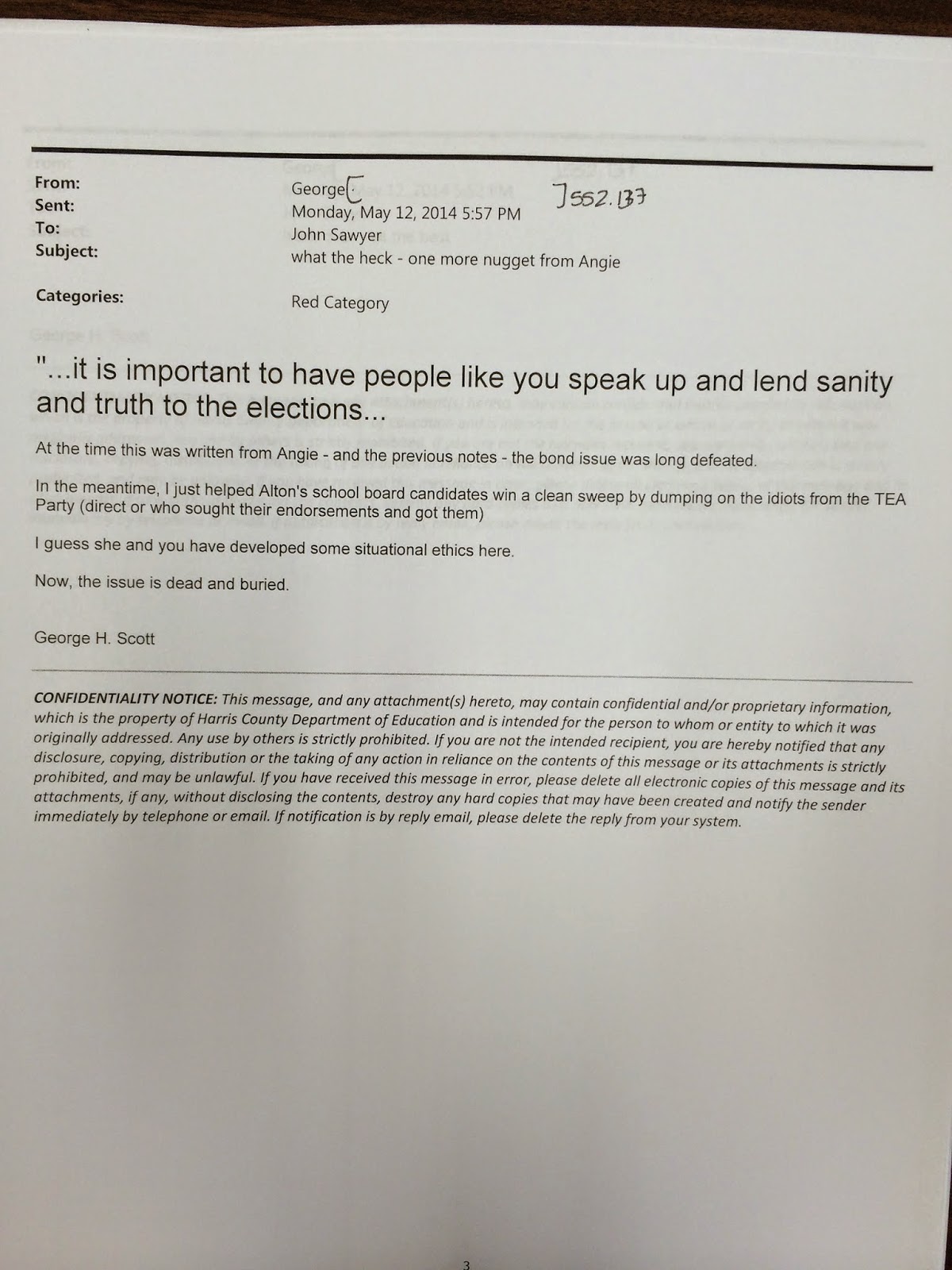
win a clean sweep by dumping on the idiots
from the TEA Party… “
President Chesnut’s email to Scott concerning the HCDE Republican primary is below:
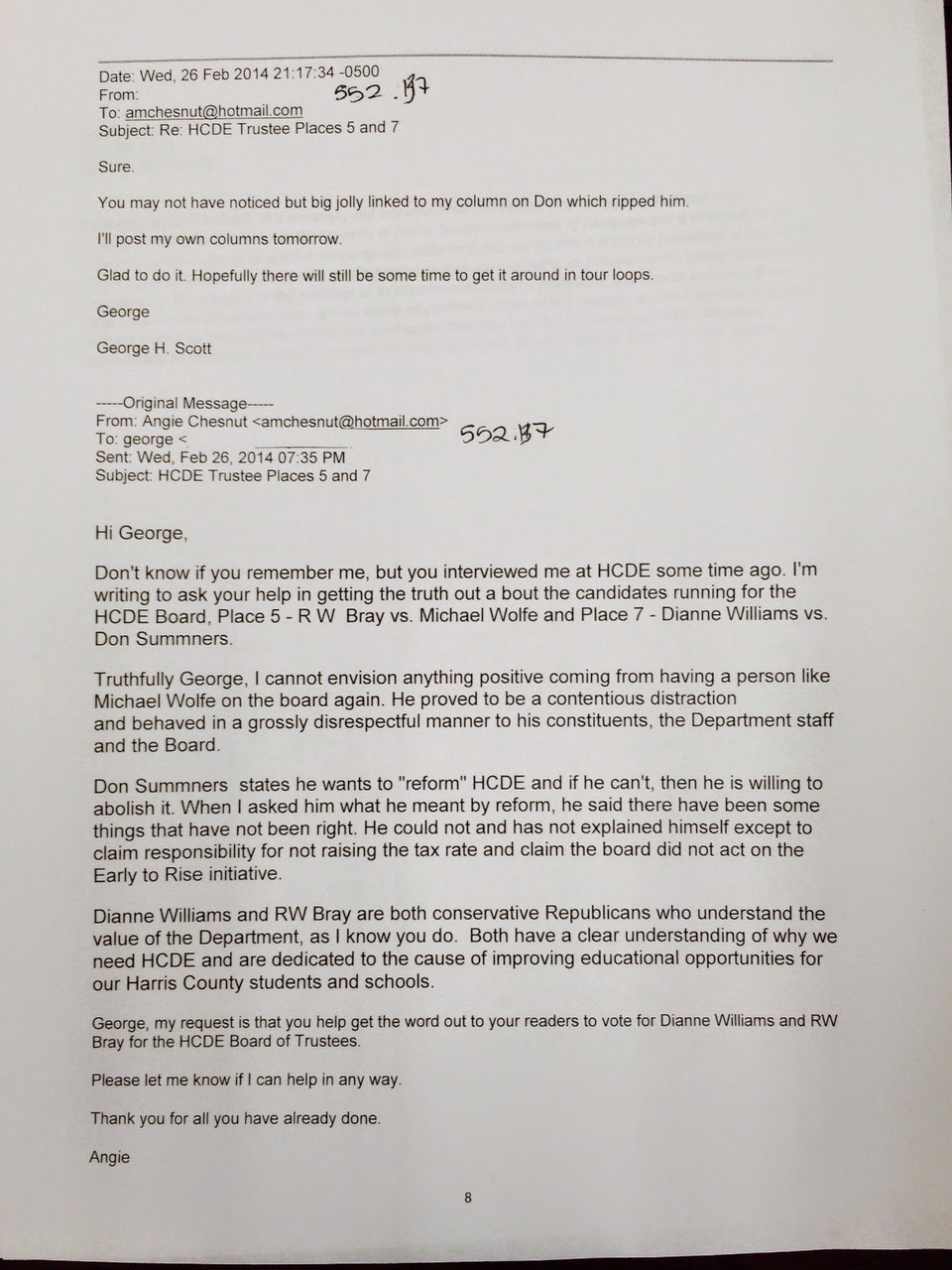
Chesnut ends her email with:
“George, my request is that you help get the word out to your readers to vote for Dianne Williams and RW Bray for the HCDE Board of Trustees. Please let me know if I can help in any way. Thank you for all you have already done.”
(Note: Chesnut ran for office as a Republican; yet she supports expanding government spending, government programs such as Head Start, government pre-k, government after school care, etc; Wolfe and Summers positions were actually the more conservative in the race. They both questioned how HCDE uses tax dollars. They both won their primaries.)
Records show Scott has received funds numerous times from HCDE.
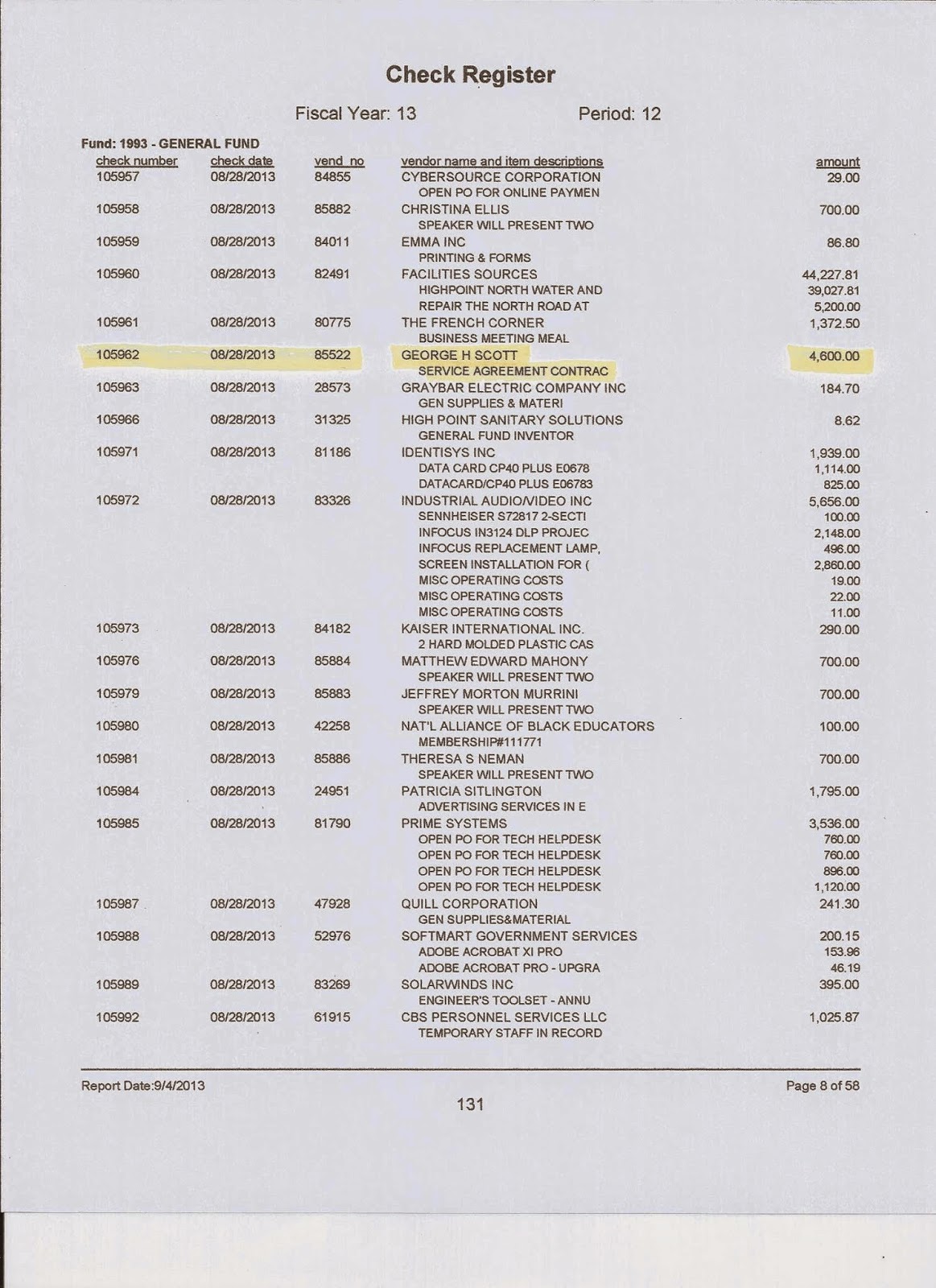
As a matter of fact, HCDE’s response to an open records request to view publications paid for by HCDE in 2013, included blog posts written by George H Scott. Some were posts critical of the Harris County Appraisal District and the rest were stories flattering to HCDE.
It does appear, however, that Scott did not have a contract 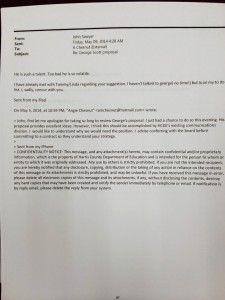
with HCDE at the time of Chesnut’s request.
Emails show Scott did submit a new proposal to HCDE for more consulting work by May.
If Chesnut had asked a blogger who did not contract with HCDE, there would not be an issue.
But, for an elected official, who casts votes on government contacts, to ask an off-on-again contractor to “help” her influence the outcome of the Republican primary election of her own board is, to say the least, inappropriate.
Lack of ethics to influence elections is one thing. Use of public employees and public funds is a whole different ballgame.
The following email shows:
HCDE Board’s Executive Assistant setting up a conference call
for 9:00am on 5/12/14 between the HCDE Superintendent, two
HCDE paid consultants, an addressee redacted by HCDE, and
two paid staffers for the Wendy Davis for Governor Campaign.
Angie Chesnut (R), the HCDE Board President, is listed as “optional.”
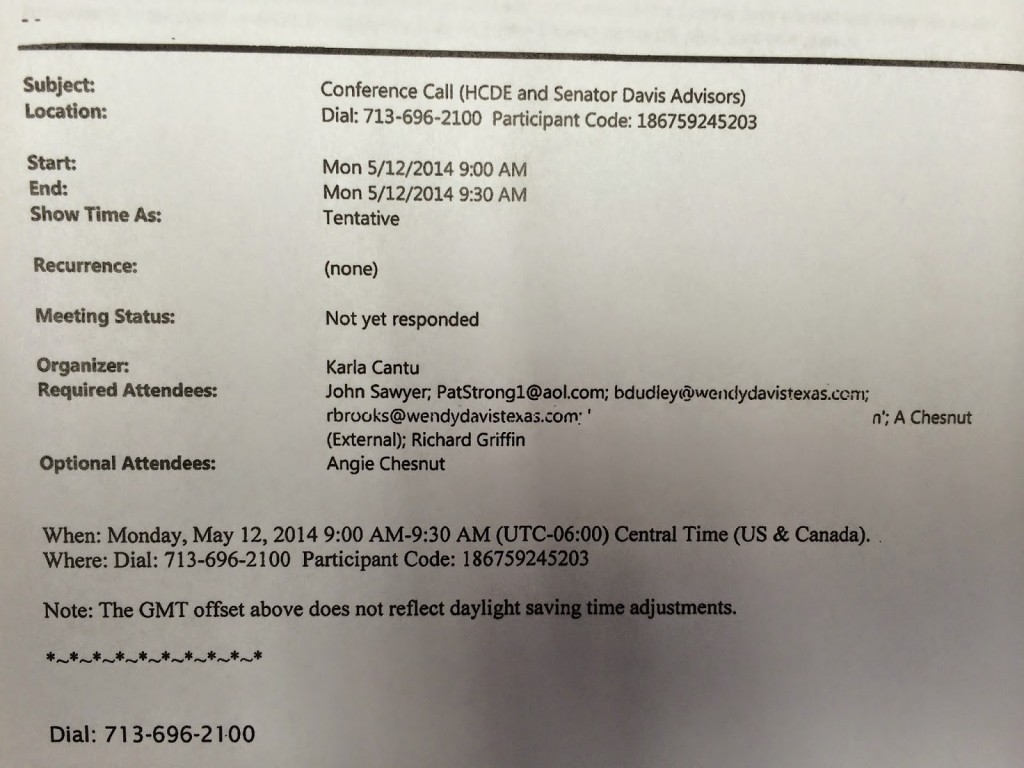
It appears the call took place on schedule because an email was sent3 hours later from HCDE Board member Diane Trautman (D) to Wendy Davis Campaign staffer, RoyceBrooks, stating,
“I enjoyed meeting you this morning on our conference call.” 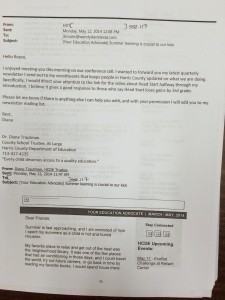
She also adds,
“Please let me know if there is anything else I can help you with…”
She attached her own quarterly newsletter which ended with:
“Pd. Pol. Adv. By the Diane Trautman Campaign…”
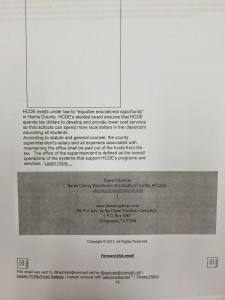
If the call had been to Sen. Wendy Davis in her capacity as a State Senator, there would not be an issue.
If the call had been on their personal time using their personal phone systems, there would not be an issue.
But, the taxpayers paying for the facilities, the phone and emails systems, the salary to set up the call, as well as the salaries and consulting fees for HCDE to participate in a call with the campaign of the Democrat candidate for governor is, to say the least, HIGHLY QUESTIONABLE.
Texas Statute does not allow the use of school district facilities and/or personnel to support candidates or parties.
(Note: When the Legislature repealed the laws governing county schools, it allowed Harris County to remain open under the old laws plus any current laws governing ISDs. TEC 11.301)

On 3/27/14 HCDE’s Education Foundation Board of Directors held their meeting at the HCDE Administration Building, a building supported completely with public funds.
HCDE’s Education Foundation is registered with the
IRS as a 501(c)(3).
In their Articles of Incorporation filed with the Texas Secretary of State the Foundation claims:
The corporation is organized exclusively for educational
purposes within the meaning of Section 501(c)(3)
of the Internal revenue Code

…the corporation shall not participate in or intervene in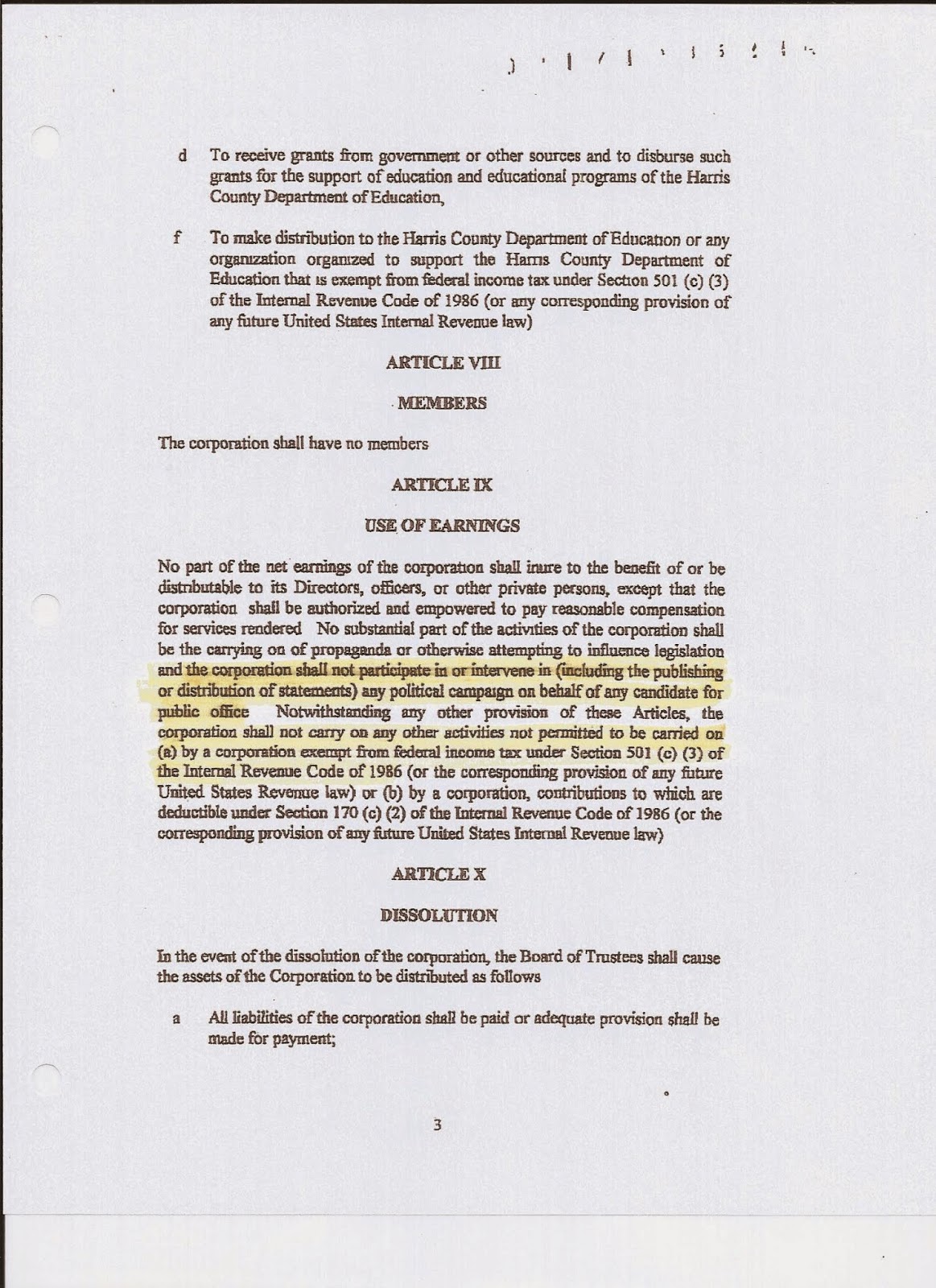
(including the publishing or distribution of statements)
any political campaign of any candidate for public office
Yet, the review of emails shows that meeting minutes were distributed using HCDE’s email system which included the following statement on page #3:
“4. The primary elections are over and the two candidates for HCDE Trustee positions I would ask you to endorse and vote for in the upcoming November election are Debra Kerner, current HCDE board vice president and Melissa Noriega, former Houston city councilwomen and administrator at HISD. The opponents for both of these women support the abolishment of HCDE, Michael Wolfe and Don Sumners.”
(Note: the candidates the foundation asked members to endorse and vote for are both Democrats. Both opponents are Republicans.)
In this case, not only did taxpayers pay for the facilities to hold the meeting and the email system to distribute the Democrat candidate endorsements, this year HCDE Board of Trustees donated $202,107 of our tax dollars to the Foundation just to fund the position of Director as well as to provide his office facilities in the HCDE Administration Building.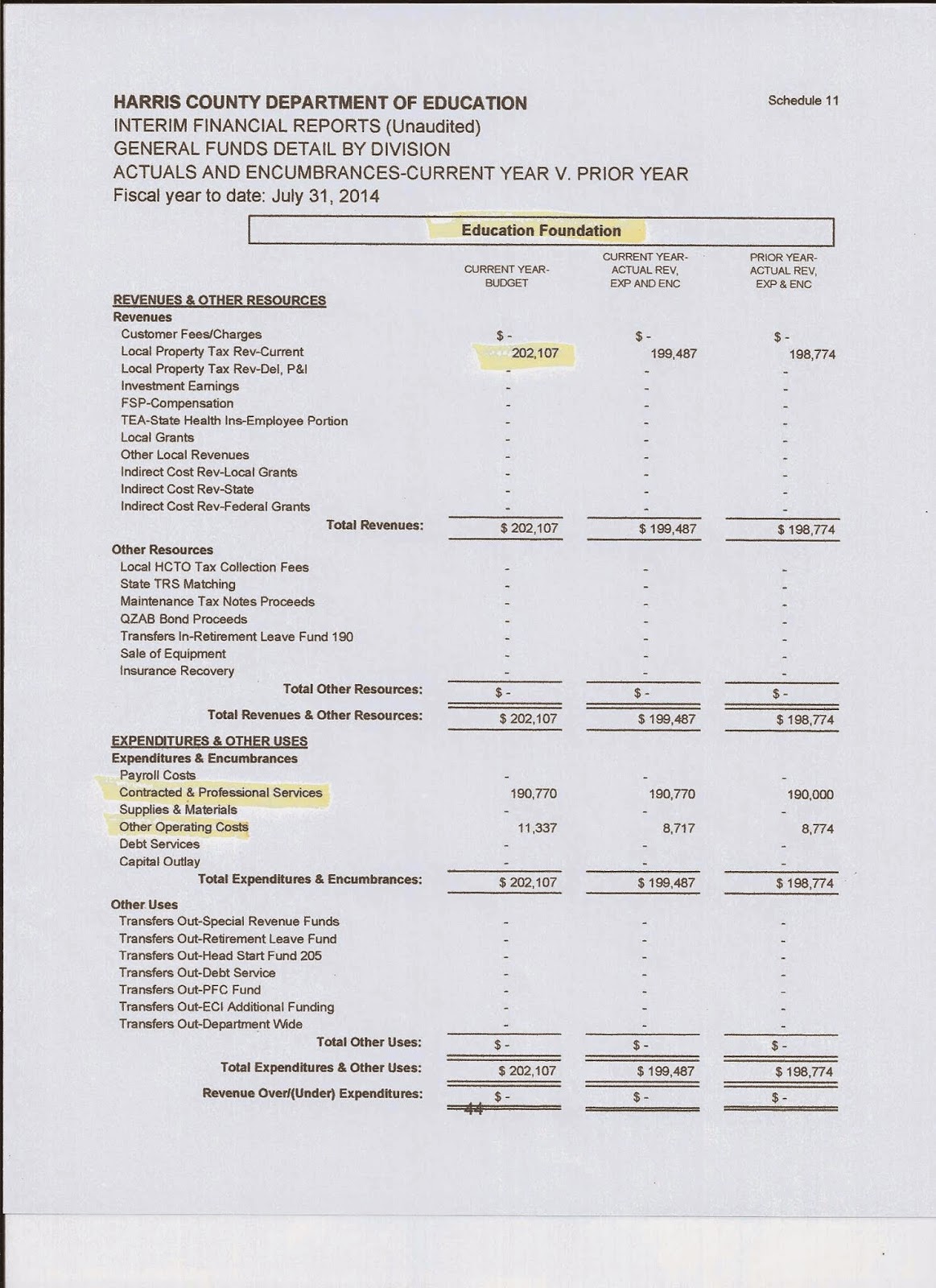
Texas Statute also does not allow school district email systems or other public funds to be used for political advertising.
IRS rules do not allow a 501(c)(3) to endorse candidates.
HCDE’s Foundation’s charter does not allow them to participate in publishing or distributing statements relating to campaigns.
In a quick look at the alphabetical list of Directors/Members of the Board on the Foundation website, the first name you see is Judge Eric Andell, Senior Justice, First Court of Appeals. This makes one question why a Senior Justice didn’t stop the Foundation from breaking the rules.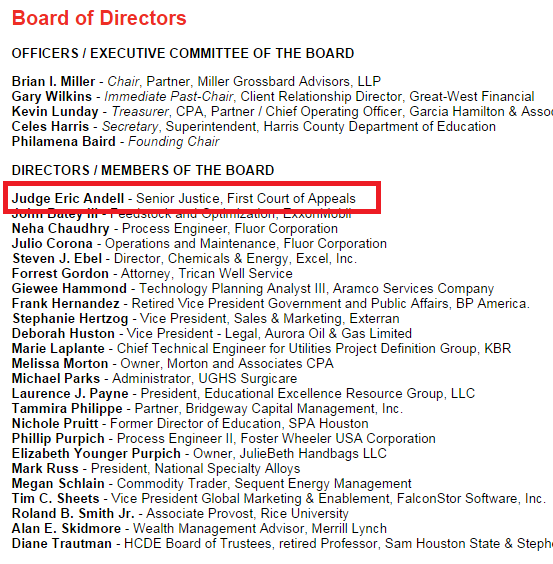
But a google search might explain it. In 2005. The Houston Chronicle reported the following:
“Former judge Eric Andell of Houston was sentenced to one year of probation and fined $5,000 Friday after pleading guilty to charges that related to cheating taxpayers out of thousands of dollars in bogus expenses charged to the federal government while he served as a top official in the U.S. Department of Education.”
A check of current judges serving the Texas Appellate Courts does not list Eric Andell.
Makes me wonder what else on the Foundation website might be questionable, or at least, slightly inaccurate.
Note: The Foundation just changed its website removing Judge Andell from their Director’s list. That was fast! On the left you will see the screen shot I took on 9/13/14. On the right you will see the page today.
Pat Strong, who participated in the conference call with the Wendy Davis Campaign, is owner of Strong Strategies. HCDE pays her $82,000 per year (plus expenses) to serve as one of their many political consultants. She oversees the HCDE Board’s “government relations” committee. Her website lists some of the politicians she has worked for:
- Congressman Ken Bentsen (D)
- Governor Ann Richards (D)
- Clinton/Gore (D)
- Democratic National Committee
- Vince Ryan (D)
- Congressman Al Green (D)
- Senator Rodney Ellis (D)
- Melissa Noriega (D) – current candidate for HCDE Board
Her HCDE duties also include keeping the board “informed” on pressing issues. The email review shows the type of “information” she sends to the HCDE Board in their weekly packet as well as the personal comments she writes in the upper right hand corners. Two examples are below.
Should taxpayers really be paying for a political consultant to forward a story to a school board that reads…..?
“…We love Wendy Davis. You love Wendy Davis. We and you want to do very sexy things to Wendy Davis, even the straight chicks…”
Reviewing all these emails made me very curious as to what 
Pat Strong reports to the HCDE Board Government Relations
Committee. So when HCDE posted a public meeting of the committee
on their website for 11:00 am on 9/16/14, I attended.
I arrived a few minutes early with my cell phone camera fully charged. Pat Strong (lady on the left with the white hair) was already seated with her report ready to present. At 11:00, President Angie Chesnut opened the meeting.
(Note: The following is an approximate transcription. Some was difficult to understand.)
Chesnut: Good morning everyone. Well, I guess the meeting is now in order. What…It is not a meeting. (difficult to understand) That’s right. It is a committee meeting.
Board Attorney: (something I can’t make out about not having a quorum.)
Chesnut: Oh true. So, with no further ado, let’s get started with Pat giving us an update on different things that have happened.
Board Attorney: (something I can’t make out)
Chesnut: Oh, since this is not an open meeting, I am going to have to ask you to leave Ms Vera, if you don’t mind. It is a closed committee meeting.
Board Attorney: It is not a meeting under the Open Meetings Act since there is no quorum.
Chesnut: It is not a posted meeting.
I complied.
Watch the short video.
AFTER Pat Strong completed her report, President Chesnut changed her mind and decided the public could view the rest of the committee meeting, even though they still did not have a quorum. By the end of the committee meeting, a board quorum was present.
You may watch the video of the meeting after Pat Strong was finished with her report and I was allowed to re-enter the room: here
Was Chesnut accurate when she stated, “This is not a posted meeting?”
In a quick check of the HCDE website, under Board Agendas, you will find the official posting of the meeting with Angie Chesnut’s signature.
What was in Pat Strong’s report to the committee that President Chesnut felt the need to hide from the public? I may never know.
But I do know that if this was a government entity using government funds and a 501(c)(3) to promote conservative Republican candidates and issues, the IRS would remove their tax exemption immediately and I’d bet our County Attorney would order an investigation.
But these government funds and the 501(c)(3) are being used to support liberal Democrat candidates and issues, so I won’t hold my breath waiting for any investigation.
Congresswoman Sheila Jackson Lee’s daughter, Erica Lee Carter, is a current HCDE Board Trustee so I don’t expect to see any action from the IRS.
In his most recent campaign financial report, our County Attorney, Vince Ryan (D) lists payments to Pat Strong for “fundraising and compliance services” so I don’t foresee any action coming from that office either.
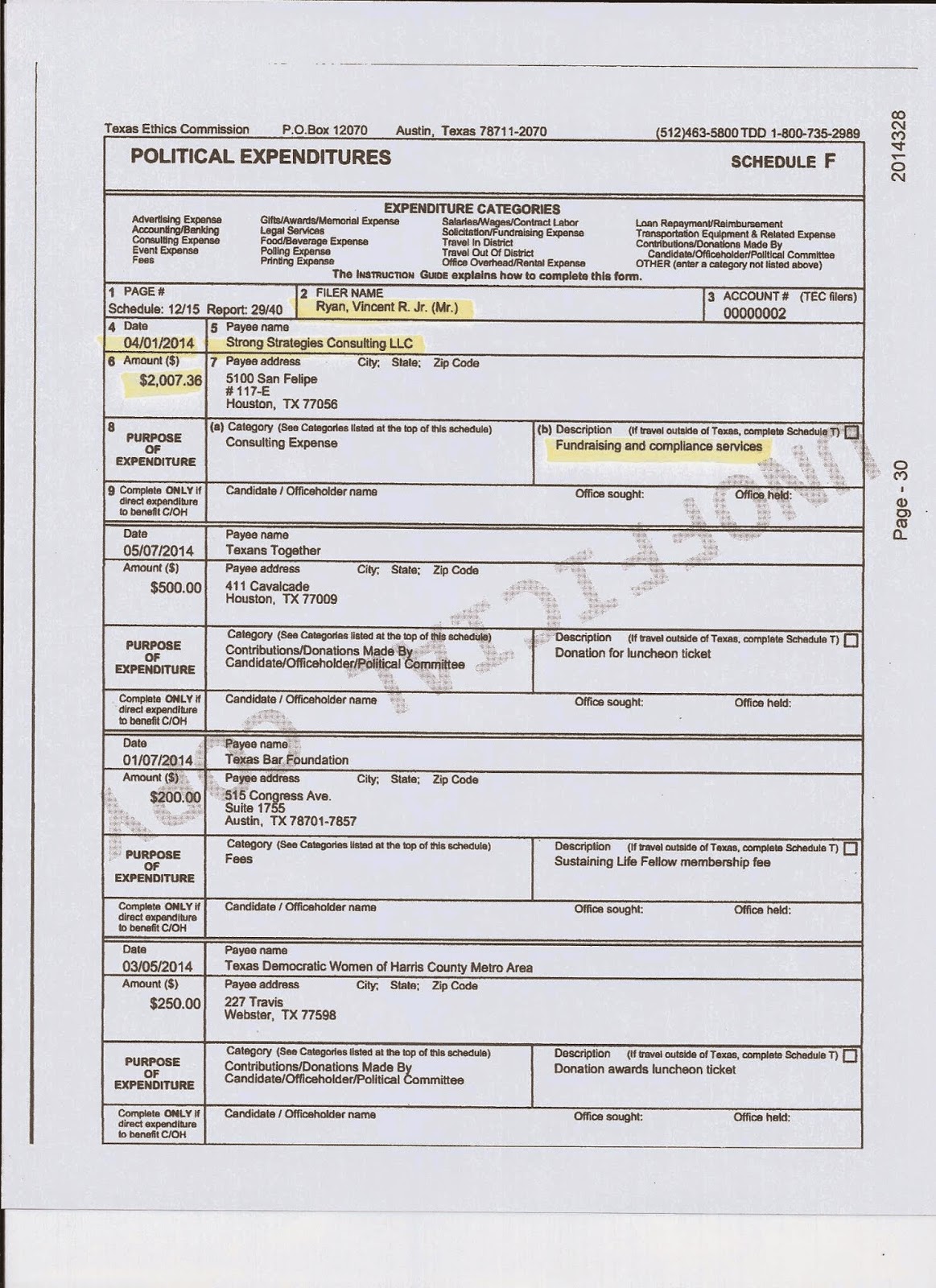
It’s stunning to me that a cursory review of emails turned up so many examples of apparent violations of state and federal statutes. I will certainly dig deeper before drawing any final conclusions.
But the fact that all this goes on right
under the nose of a Board President
who is a self-proclaimed
“conservative Republican”
in my opinion, is nothing short of shameful.
Absolutely shameful.
Arne Duncan and Angie Chesnut
If you agree, you may contact HCDE Board President Angie Chesnut at: achesnut@hcde-texas.org
Colleen Vera
www.texastrashtalk.com











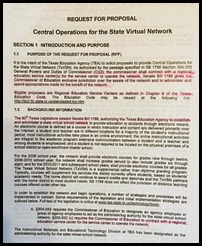
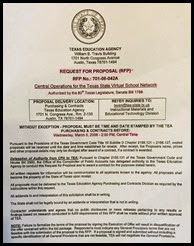

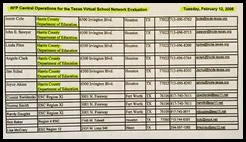
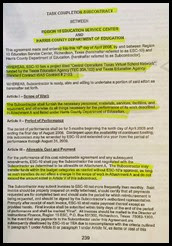





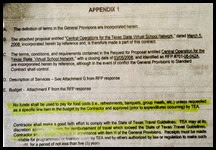
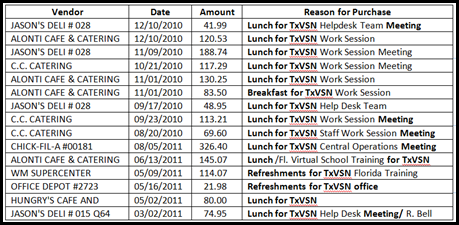
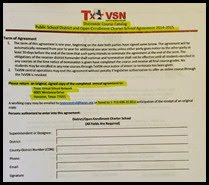
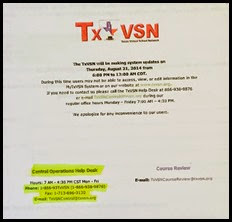
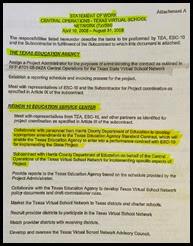



















 On 9/13/14
On 9/13/14

 nk 2
nk 2

